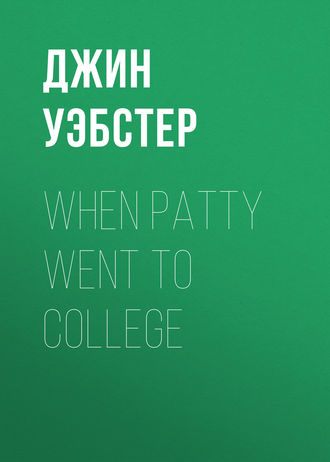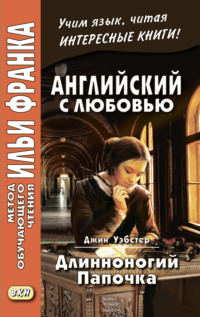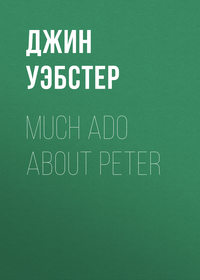 полная версия
полная версияWhen Patty Went to College
"I should have thought the old one would have discouraged her from keeping butlers," said Georgie.
"You would think so," said Patty; "but she was a very persevering woman. On the day that Raoul—that's his name—came to call, nineteen people had applied for the place, and Mrs. Trent was worn out from interviewing them. So she told Miss Sarah—that's her daughter—to attend to those who came in the evening. Miss Sarah was tall and wore spectacles, and was—was—"
"A good disciplinarian," suggested the Twin.
"Yes," said Patty, feelingly, "an awfully good disciplinarian. Well, when Raoul got there he gave his card to Ellen and asked for me; but Ellen didn't understand, and she called Miss Sarah, and when Miss Sarah saw him in his evening clothes she—"
"Took him for a butler," put in Georgie.
"Yes, she took him for a butler; and she looked at the card he'd given Ellen, and said icily, 'What does this mean?'
"'It's—it's my name,' he stammered.
"'I see,' said Miss Sarah; 'but where is your recommendation?'
"'I didn't know it was necessary,' he said, terribly scared.
"'Of course it's necessary,' Miss Sarah returned. 'I can't allow you to come into the house unless I have letters from the places where you've been before.'
"'I didn't suppose you were so strict,' he said.
"'We have to be strict,' Miss Sarah answered firmly. 'Have you had much experience?'
"He didn't know what she meant, but he thought it would be safest to say he hadn't.
"'Then of course you won't do,' she replied. 'How old are you?'
"He was so frightened by this time that he couldn't remember. 'Nineteen,' he gasped—'I mean twenty.'
"Miss Sarah saw his confusion, and thought he had designs on some of the heiresses intrusted to her care. 'I don't see how you dared to come here,' she said severely. 'I should not think of having you in the house for a moment. You're altogether too young and too good-looking.' And with that Raoul got up and bolted.
"When Ellen told Miss Sarah the next day that he'd asked for me, she was terribly mortified, and she made me write and explain, and invite him to dinner; but wild horses couldn't have dragged him into the house again. He's been afraid to stop off in Washington ever since. He always goes straight through on a sleeper, and says he has nightmares even then."
"And is that why he won't come to the college?"
"Yes," said Patty; "that's the reason. I told him we didn't have any butlers here; but he said we had lady faculty, and that's as bad."
"But I thought you said he was coming to the Prom."
"He is this time."
"Are you sure?"
"Yes," said Patty, with ominous emphasis, "I'm sure. He knows," she added, "what will happen if he doesn't."
"What will happen?" asked the Twin.
"Nothing."
The Twin shook her head, and Georgie inquired, "Then why don't you make out his program?"
"I suppose I might as well. I didn't do it before because it sort of seemed like tempting Providence. I didn't want to be the cause of any really serious accident happening to him," she explained a trifle ambiguously as she got out pencil and paper. "What dances can you give me, Lucille? And you, Georgie, have you got the third taken?"
While this business was being settled, a knock unheeded had sounded on the door. It came again.
"What's that?" asked Priscilla. "Did some one knock? Come in."
The door opened, and a maid stood upon the threshold with a yellow envelope in her hand. She peered uncertainly around the darkened room from one face to another. "Miss Patty Wyatt?" she asked.
Patty stretched out her hand in silence for the envelop, and, propping it up on her desk, looked at it with a grim smile.
"What is it, Patty? Aren't you going to read it?"
"There's no need. I know what it says."
"Then I'll read it," said Priscilla, ripping it open.
"Is it a leg or an arm?" Patty inquired with mild curiosity.
"Neither," said Priscilla; "it's a collar-bone."
"Oh," murmured Patty.
"What is it?" demanded Georgie the curious. "Read it out loud."
"New Haven, November 29."Broke collar-bone playing foot-ball. Honest Injun. Terribly sorry. Better luck next time."
"Raoul.""There will not," observed Patty, "be a next time."
III
The Impressionable Mr. Todhunter
"HAS the mail been around yet?" called Priscilla to a girl at the other end of the corridor.
"Don't believe so. It hasn't been in our room."
"There she comes now!" and Priscilla swooped down upon the mail-girl. "Got anything for 399?"
"Do you want Miss Wyatt's mail too?"
"Yes; I'll take everything. What a lot! Is that all for us?" And Priscilla walked down the corridor swinging her note-book by its shoe-string, and opening envelops as she went. She was presently joined by Georgie Merriles, likewise swinging a note-book by a shoe-string.
"Hello, Pris; going to English? Want me to help carry your mail?"
"Thank you," said Priscilla; "you may keep the most of it. Now, that," she added, holding out a blue envelop, "is an advertisement for cold cream which no lady should be without; and that"—holding out a yellow envelop—"is an advertisement for beef extract which no brain-worker should be without; and that"—holding out a white envelop—"is the worst of all, because it looks like a legitimate letter, and it's nothing but a 'Dear Madam' thing, telling me my tailor has moved from Twenty-second to Forty-third Street, and hopes I'll continue to favor him with my patronage.
"And here," she went on, turning to her room-mate's correspondence, "is a cold-cream and a beef-extract letter for Patty, and one from Yale; that's probably Raoul explaining why he couldn't come to the Prom. It won't do any good, though. No mortal man can ever make her believe he didn't have his collar-bone broken on purpose. And I don't know whom that's from," Priscilla continued, examining the last letter. "It's marked 'Hotel A–, New York.' Never heard of it, did you? Never saw the writing before, either."
Georgie laughed. "Do you keep tab on all of Patty's correspondents?"
"Oh, I know the most of them by this time. She usually reads the interesting ones out loud, and the ones that aren't interesting she never answers, so they stop writing. Hurry up; the bell's going to ring"; and they pushed in among the crowd of girls on the steps of the recitation-hall.
The bell did ring just as they reached the class-room, and Priscilla dropped the letters, without comment, into Patty's lap as she went past. Patty was reading poetry and did not look up. She had assimilated some ten pages of Shelley since the first bell rang, and as she was not sure which would be taken up in class, she was now swallowing Wordsworth in the same voracious manner. Patty's method in Romantic Poetry was to be very fresh on the first part of the lesson, catch the instructor's eye early in the hour, make a brilliant recitation, and pass the remainder of the time in gentle meditation.
To-day, however, the unwonted bulk of her correspondence diverted her mind from its immediate duty. She failed to catch the instructor's eye, and the recitation proceeded without her assistance. Priscilla watched her from the back seat as she read the Yale letter with a skeptical frown, and made a grimace over the blue and the yellow; but before she had reached the Hotel A–, Priscilla was paying attention to the recitation again. It was coming her way, and she was anxiously forming an opinion on the essential characteristics of Wordsworth's view of immortality.
Suddenly the room was startled by an audible titter from Patty, who hastily composed her face and assumed a look of vacuous innocence—but too late. She had caught the instructor's eye at last.
"Miss Wyatt, what do you consider the most serious limitations of our author?"
Miss Wyatt blinked once or twice. This question out of its context was not illuminating. It was a part of her philosophy, however, never to flunk flat; she always crawled.
"Well," she began with an air of profound deliberation, "that question might be considered in two ways, either from an artistic or a philosophic standpoint."
This sounded promising, and the instructor smiled encouragingly. "Yes?" she said.
"And yet," continued Patty, after still profounder deliberation, "I think the same reason will be found to be the ultimate explanation of both."
The instructor might have inquired, "Both what?" but she refrained and merely waited.
Patty thought she had done enough, but she plunged on desperately: "In spite of his really deep philosophy we notice a certain—one might almost say dash about his poetry, and a lack of—er—meditation which I should attribute to his immaturity and his a—rather wild life. If he had lived longer I think he might have overcome it in time."
The class looked dazed, and the corners of the instructor's mouth twitched. "It is certainly an interesting point of view, Miss Wyatt, and, as far as I know, entirely original."
As they were crowding out at the end of the recitation Priscilla pounced upon Patty. "What on earth were you saying about Wordsworth's youth and immaturity?" she demanded. "The man lived to be over eighty, and composed a poem with his last gasp."
"Wordsworth? I was talking about Shelley."
"Well, the class wasn't."
"How should I know?" Patty demanded indignantly. "She said 'our author,' and I avoided specific details as long as I could."
"Oh, Patty, Patty! and you said he was wild—the lamblike Wordsworth!"
"What were you laughing at, anyway?" demanded Georgie.
Patty smiled again. "Why, this" she said, unfolding the Hotel A– letter. "It's from an Englishman, Mr. Todhunter, some one my father discovered last summer and invited out to stay with us for a few days. I'd forgotten all about him, and here he writes to know whether and when he may call, and, if so, will it be convenient for him to come to-night. That's a comprehensive sentence, isn't it? His train gets in at half-past five and he'll be out about six."
"He isn't going to take any chances," said Priscilla.
"No," said Patty; "but I don't mind. I invited him to come out to dinner some night, though I'd forgotten it. He's really very nice, and, in spite of what the funny papers say about Englishmen, quite entertaining."
"Intentionally or unintentionally?" inquired Georgie.
"Both," said Patty.
"What's he doing in America?" asked Priscilla. "Not writing a book on the American Girl, I hope."
"Not quite as bad as that," said Patty. "He's corresponding for a newspaper, though." She smiled dreamily. "He's very curious about college."
"Patty, I hope you were not guilty of trying to make an Englishman, a guest in your father's house, believe any of your absurd fabrications!"
"Of course not," said Patty; "I was most careful in everything I told him. But," she acknowledged, "he—he gets impressions easily."
"It is easy to get impressions when one is talking with you," observed Georgie.
"He asked me," Patty continued, ignoring this remark, "what we studied in college! But I remembered that he was an alien in a foreign land, and I curbed my natural instincts, and outlined the courses in the catalogue verbatim, and I explained the different methods of instruction, and described the library and laboratories and lecture-rooms."
"Was he impressed?" asked Priscilla.
"Yes," said Patty; "I think you might almost say dazed. He asked me apologetically if we ever did anything to relieve the strain,—had any amusements, you know,—and I said, oh, yes; we had a Browning and an Ibsen club, and we sometimes gave Greek tragedies in the original. He was positively afraid to come near me again, for fear I'd forget and talk to him in Greek instead of English."
In view of the facts, Patty's friends considered this last remark distinctly humorous, for she had flunked her freshman Greek three times, and had been advised by the faculty to take it over sophomore year.
"I hope, since he's a newspaper writer," said Priscilla, "that you'll do something to lighten his impression, or he'll never favor women's colleges in England."
"I hadn't thought of that," said Patty; "perhaps I ought."
They had reached the steps of the dormitory. "Let's not go in," said Georgie; "let's go down to Mrs. Muldoon's and get some chocolate cake."
"Thank you," said Priscilla; "I'm in training."
"Soup, then."
"Can't eat between meals."
"You come, then, Patty."
"Sorry, but I've got to take my white dress down to the laundry and have it pressed."
"Are you going to dress up for him to the extent of evening clothes?"
"Yes," said Patty; "I think I owe it to the American Girl."
"Well," sighed Georgie, "I'm hungry, but I suppose I might as well go in and dress that doll for the College Settlement Association. The show's to-night."
"Mine's done," said Priscilla; "and Patty wouldn't take one. Did you see Bonnie Connaught sitting on the back seat in biology this morning, hemming her doll's petticoat straight through the lecture?"
"Really?" laughed Patty. "It's a good thing Professor Hitchcock's near-sighted."
The College Settlement Association, by way of parenthesis, was in the habit of distributing three hundred dolls among the students every year before Christmas, to be dressed and sent to the settlement in New York. The dolls were supposed to be so well dressed that the East Side mothers could use them as models for the clothing of their own children, though it must be confessed that the tendency among the girls was to strive for effect and not for detail. On the evening before the dolls were to be shipped a doll show was regularly held, at which two cents admittance was charged (stamps accepted) to pay the expressage.
It was ten minutes past six, and Phillips Hall (such of it as was not late) was dining, when the maid arrived with Mr. Algernon Vivian Todhunter's card. Patty, radiant in a white evening gown, was trying, with much squirming, to fasten it in the middle of the back.
"Oh, Sadie," she called to the maid, "would you mind coming in here and buttoning my dress? I can't reach it from above or below."
"You look just beautiful, Miss Wyatt," said Sadie, admiringly.
Patty laughed. "Do you think I can uphold the honor of the nation?"
"To be sure, miss," said Sadie, politely.
Patty ran down the corridor to the door of the reception-room, and then swept slowly in with what she called an air of continental repose. The room was empty. She glanced about in some surprise, for she knew that the two reception-rooms on the other side of the hall were being used for the doll show. She tiptoed over and peered in through the half-open door. The room was filled with dolls in rows and tiers; every piece of furniture was covered with them; and in a far corner, at the end of a long vista of dolls, appeared Mr. Algernon Vivian Todhunter, gingerly sitting on the edge of a sofa, surrounded by flaxen-haired baby dolls, and awkwardly holding in his lap the three he had displaced.
Patty drew back behind the door, and spent fully three minutes in regaining her continental repose; then she entered the room and greeted Mr. Todhunter effusively. He carefully transferred the dolls to his left arm and stood up and shook hands.
"Let me take the little dears," said Patty, kindly; "I'm afraid they're in your way."
Mr. Todhunter murmured something about its being a pleasure and a privilege to hold them.
Patty plumped up their clothes and rearranged them on the sofa with motherly solicitude, while Mr. Todhunter watched her gravely, his national politeness and his reportorial instinct each struggling for the mastery. Finally he began tentatively: "I say, Miss Wyatt, do—er—the young ladies spend much time playing with dolls?"
"No," said Patty, candidly; "I don't think you could say they spend too much. I have never heard of but one girl actually neglecting her work for it. You mustn't think that we have as many dolls as this here every night," she went on. "It is rather an unusual occurrence. Once a year the girls hold what they call a doll show to see who has dressed her doll the best."
"Ah, I see," said Mr. Todhunter; "a little friendly rivalry."
"Purely friendly," said Patty.
As they started for the dining-room Mr. Todhunter adjusted his monocle and took a parting look at the doll show.
"I'm afraid you think us childish, Mr. Todhunter," said Patty.
"Not at all, Miss Wyatt," he assured her hastily. "I think it quite charming, you know, and so—er—unexpected. I had always been told that they played somewhat peculiar games at these women's colleges, but I never supposed they did anything so feminine as to play with dolls."
When Patty returned to her room that night, she found Georgie and Priscilla surrounded by grammars and dictionaries, doing German prose. Her appearance was hailed with a cry of indignant protest.
"When I have a man," said Priscilla, "I divide him up among my friends."
"Especially when he's a curiosity," added Georgie.
"And we dressed up in grand clothes, and stood in your way coming out of chapel," went on Priscilla, "and you never even looked at us."
"Englishmen are so bashful," apologized Patty; "I didn't want to frighten him."
Priscilla looked at her suspiciously. "Patty, I hope you didn't impose on the poor man's credulity."
"Certainly not!" said Patty, with dignity. "I explained everything he asked me, and was most careful not to exaggerate. But," she added with engaging frankness, "I cannot be responsible for any impressions he may have obtained. When an Englishman once gets an idea, you know, it's almost impossible to change it."
IV
A Question of Ethics
PATTY'S class-room methods were the result of a wide experience in the professorial type of mind. By her senior year she had reduced the matter of recitation to a system, and could foretell with unvarying precision the day she would be called on and the question she would be asked. Her tactics varied with the subject and the instructor, and were the result of a penetration and knowledge of human nature that might have accomplished something in a worthier cause.
In chemistry, for example, her instructor was a man who had outlived any early illusions in regard to the superior conscientiousness of girls over boys. He was not by nature a suspicious person, but a long experience in teaching had inculcated an inordinate wariness which was sometimes out of season. He allowed no napping in his classes, and those who did not pay attention suffered. Patty discovered his weakness early in the year, and planned her campaign accordingly. As long as she did not understand the experiment in hand, she would watch him with a face beaming with intelligence; but when she did understand, and wished to recite, she would let her eyes wander to the window with a dreamy, far-away smile, and, being asked a question, would come back to the realities of chemistry with a start, and, after a moment of ostentatious pondering, make a brilliant recitation. It must be confessed that her moments of abstraction were rare; she was far too often radiantly interested.
In French her tactics were exactly opposite. The instructor, with all the native politeness of his race, called on those only who caught his eye and appeared willing and anxious to recite. This made the matter comparatively simple, but still required considerable finesse. Patty dropped her pen, spilled the pages from her note-book, tied her shoe-string, and even sneezed opportunely in order not to catch his eye at inconvenient moments. The rest of the class, who were not artists, contented themselves with merely lowering their eyes as he looked along the line—a method which in Patty's scornful estimation said as plainly as words, "Please don't call on me; I don't know."
But with Professor Cairnsley, who taught philosophy, it was more difficult to form a working hypothesis. He had grown old in the service of the college, and after thirty years' experience of girl-nature he was still as unsuspiciously trustful as he had been in the beginning. Taking it for granted that his pupils were as interested in the contemplation of philosophic truths as he himself, the professor conducted his recitations without a suspicion of guile, and based his procedure entirely upon the inspiration of the moment. The key to his method had always remained a mystery, and several generations of classes had searched for it in vain. Some averred that he called on every seventh girl; others, that he drew lots. Patty triumphantly announced early in the course that she had discovered the secret at last—that on Monday he called on the red-haired girls; on Tuesday, those with yellow hair; on Wednesday and Thursday, those with brown; and on Friday, those with black. But this solution, like the others, was found to break down in actual practice; and Patty, for one, discovered that it required all her ingenuity, and even a good deal of studying, to maintain her reputation for brilliancy in Professor Cairnsley's classes. And she cared about maintaining it, for she liked the professor and was one of his favorite pupils. She had known his wife before she entered college, and she often called upon them in their home, and, in short, exemplified the ideal relations between faculty and students.
Owing to the pressure of many interests, Patty's researches into philosophy were not as deep as the intentions of the course, but she had a very good working knowledge, which, in its details, would have astonished Professor Cairnsley could he have got behind the scenes. Though her knowledge was not based strictly on the text-book, her reputation in the class was good, and, as Patty admitted with a sigh, "It's a great strain on the imagination to keep up a reputation in philosophy."
It had been established, indeed, as far back as her sophomore year, when the psychology class was awed into silence by its first introduction to the abstractions of science, and Patty alone had dared to lift her voice. The professor, one morning, had been placidly lecturing along on the subject of sensation, and in the course of the lecture had remarked: "It is probable that the individual experiences all the primary sensations during the first few months of infancy, and that in after life there is no such thing as a new sensation."
"Professor Cairnsley," Patty piped up, "did you ever shoot the chutes?"
The ice was broken at last, and the class felt at home, even in the somewhat deep waters of philosophy; and Patty, however undeservedly, had gained the credit of having a deeper insight than most into matters psychical.
And so into her senior year, when she entered upon the study of ethics, she carried along an unearned and fragile reputation, built upon subterfuges and likely to crumble at the slightest touch. She had maintained it very creditably up to the Christmas vacation, and had argued upon the ultimate ground of moral obligation and the origin of conscience quite as intelligently as though she had previously read what the text-book had to say on the subject. But when they had commenced the study of specific theologies, based upon definite historical facts, Patty found her imagination of little use, and on several occasions it had been purely good luck that had saved her from exposure. Once the bell had rung at an opportune moment, and twice she had been able to avert a direct answer by leading the discussion into side issues. She realized, however, that fortune would not always favor her, and as the professor usually forgot to call the roll, she formed the nefarious practice of cutting class when she did not have her lesson.
For a week or so in particular, her pressure of work in other directions (not all of them scholastic) had prevented her from devoting her usual amount of energy to the task of maintaining her philosophy reputation, and she had, without conscience, cut ethics several days in succession, and had failed to comment upon the fact to the professor.
"What did he lecture about in ethics—those recitations I missed?" she inquired of Priscilla, one afternoon.
"Swedenborg."
"Swedenborg," repeated Patty, dreamily. "He got up a new religion, didn't he? Or was it a new system of gymnastics? I've heard about him, but I don't seem to remember any details."











